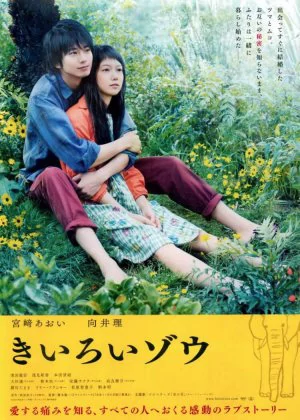Yellow Elephant
It's not that easy keeping up with Ryuichi Hiroki's body of work. Yellow Elephant [Kiiroi Zu]) is not his latest film (it's the first of four films already released in 2013), but as always international distribution is seriously lacking and English-friendly subtitles are often an issue when tracking down Japanese dvd releases. The other three films are still off the radar, but Yellow Elephant is available for the adventurous and offers a solid fix for Hiroki adepts.

Hiroki (Love On Sunday - Last Words, Kimi no Tomodachi, Girlfriend: Please Stop The World, Kikansha Sensei, Yawarakai Seikatsu, M) is going through some tough times. Ever since the release of New Type, the once so stable quality of his output has started to sway, never really reaching the heights of his former self. It's not that he hasn't released any good films since (Keibetsu was great), but for the first time in a long time he also released some less satisfying films.
Luckily Yellow Elephant ends up on the right side of the balance. It's not up there with the best of his films, but it contains enough memorable scenes and as a whole it's a more than gracious addition to Hiroki's oeuvre. The film starts off a lot happier than usually the case though. The first 15 minutes are so upbeat that they really surprised me. Also the choice to add some magical elements came as quite a shock, but it does set a nice start for the drama that is to come.
Yellow Elephant follows the lives of a young couple who just moved to the countryside. They appear happy and even though they clearly don't have any money to spare, they live a rich and fulfilling life. Ayumu is an aspiring writer while Aiko (who is supposedly able to talk to animals and trees) stays home and tends to the house. But soon after the first cracks are starting to show and through some flashbacks we learn about the unique past of this young couple.

On the visual side of things, Yellow Elephant is definitely one of Hiroki's better looking films. Gone is Hiroki's signature mobile, agile camera work, instead he clearly spent more time on elaborate camera movements and choice of color and lighting. Stylistically, this brings Yellow Elephant somewhat closer to the more traditional Japanese dramas, though Hiroki demonstrates he can do wonderful things with this look without copying it one on one. A pretty successful experiment if you ask me.
At the start of the film the soundtrack is pleasantly quirky, matching the feel-good atmosphere of the first 15 minutes just perfectly. Hiroki chooses more traditional tracks once the real drama settles in, but the overall feel of the music remains unique enough. There are some J-Pop tunes mixed in with the rest of the soundtrack, and while it may deter non-fans Hiroki uses them wisely, never allowing them to cheapen the emotional impact of particular scenes.
Most of the film's dramatic weight lands on the shoulders of Aoi Miyazaki (Tada, Kimi Wo Aishiteru), who handles her role well. It's no surprise she copes with the feel-good parts just perfectly, but Miyazaki clearly has talent for drama too as she truly shines in the darker and rawer parts of Hiroki's drama. Osamu Mukai can't quite keep up, especially in the second part of the film where his character too is under emotional distress, but as a couple they balance out quite well.

It's interesting to see how Hiroki deconstructs the seemingly perfect relationship between Aiko and Ayumu, focusing on the little cracks first and going back in time to look for the answers afterwards. The film starts to drift a little once it nears its emotional finale, but Hiroki repairs the balance just in time to make for a nice, satisfying ending.
Thanks to its slightly magical touches and its strong shifts between feel-good and drama, Yellow Elephant rises above the majority of other Japanese dramas out there. That and Hiroki's strong sense of direction of course. It's not his best film and if you're looking for an entry point in the Japanese drama genre there are definitely better options, but Yellow Elephant is a worthy addition to Hiroki's oeuvre and a welcome reminder that Japanese is still able to produce quality drama features.
